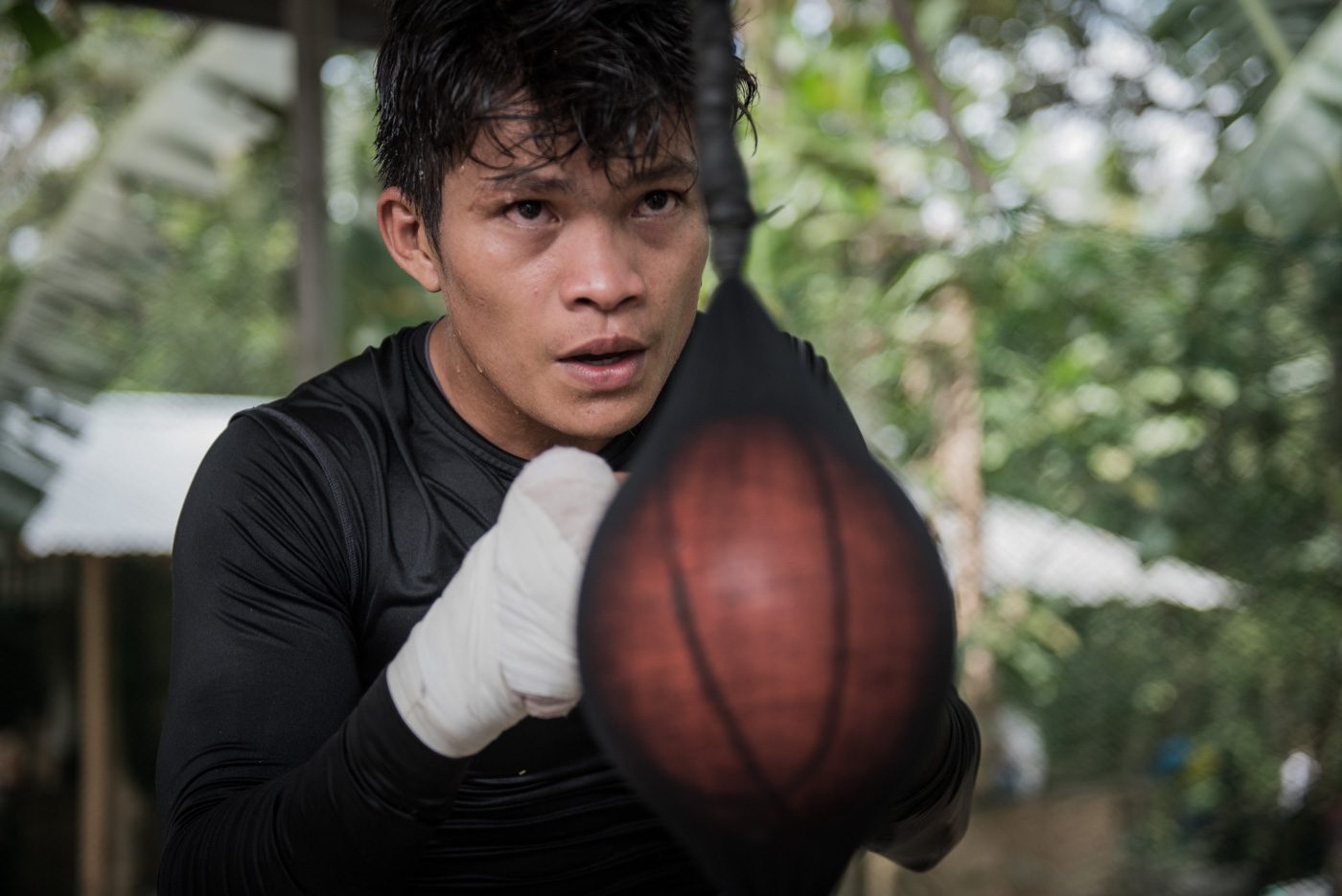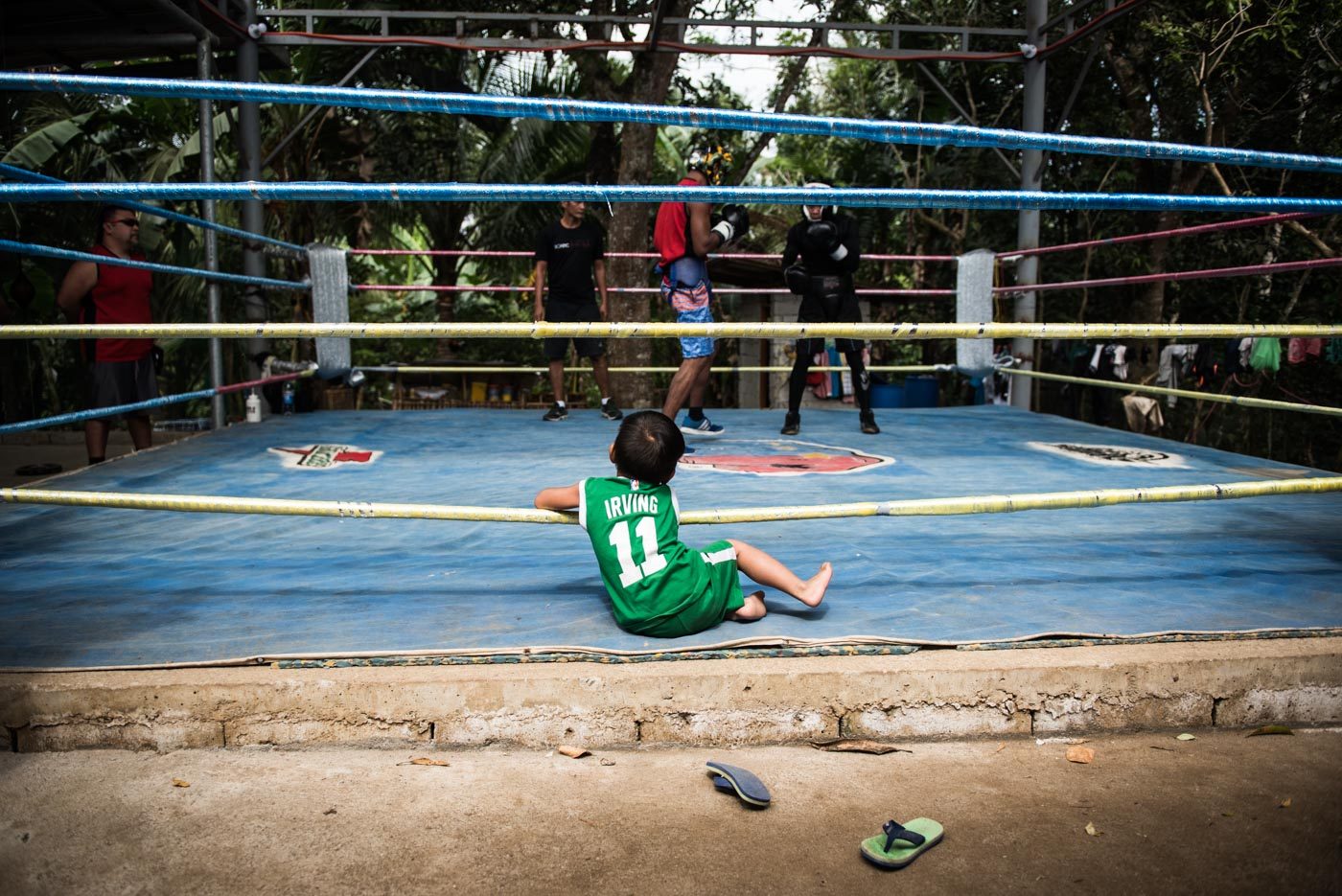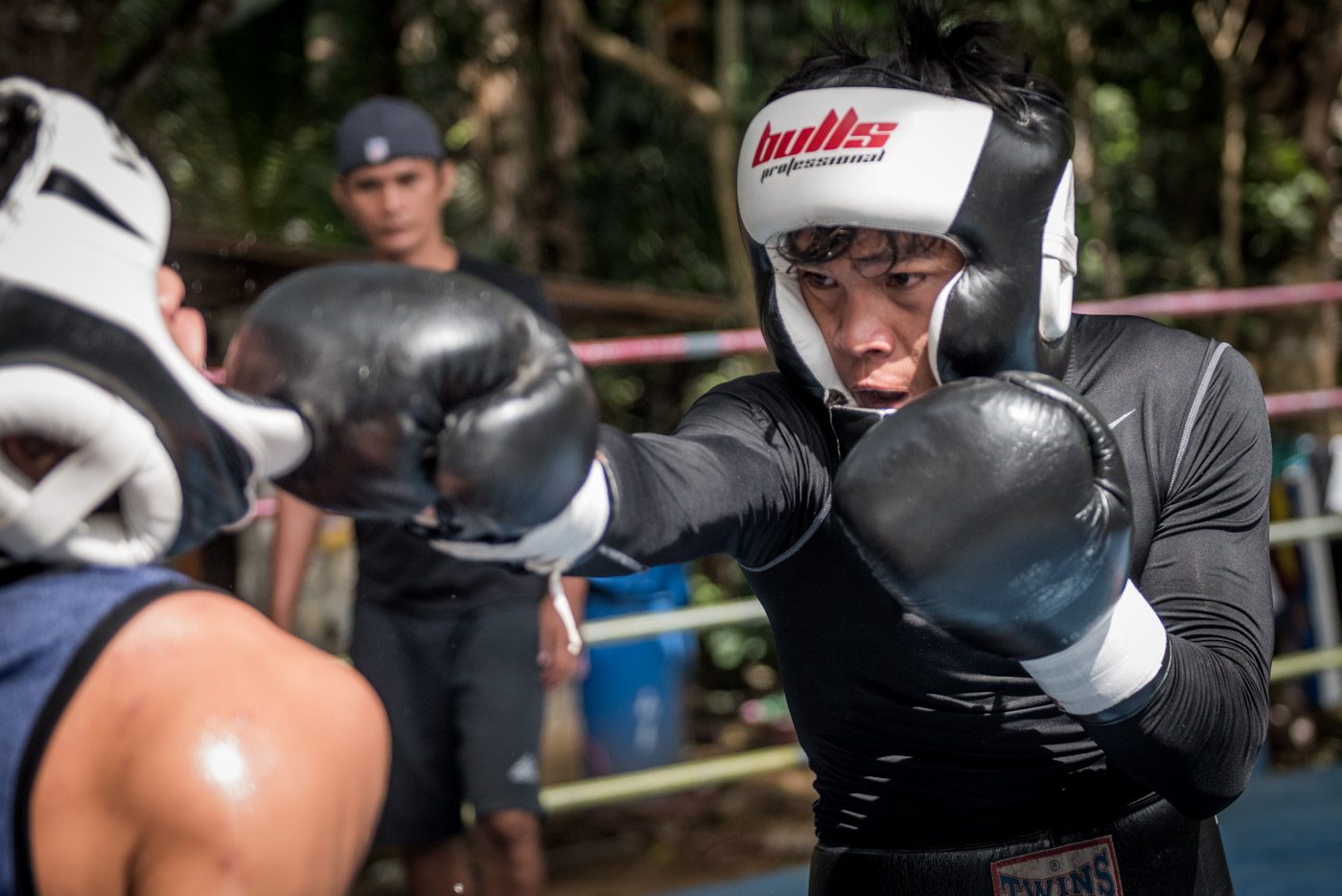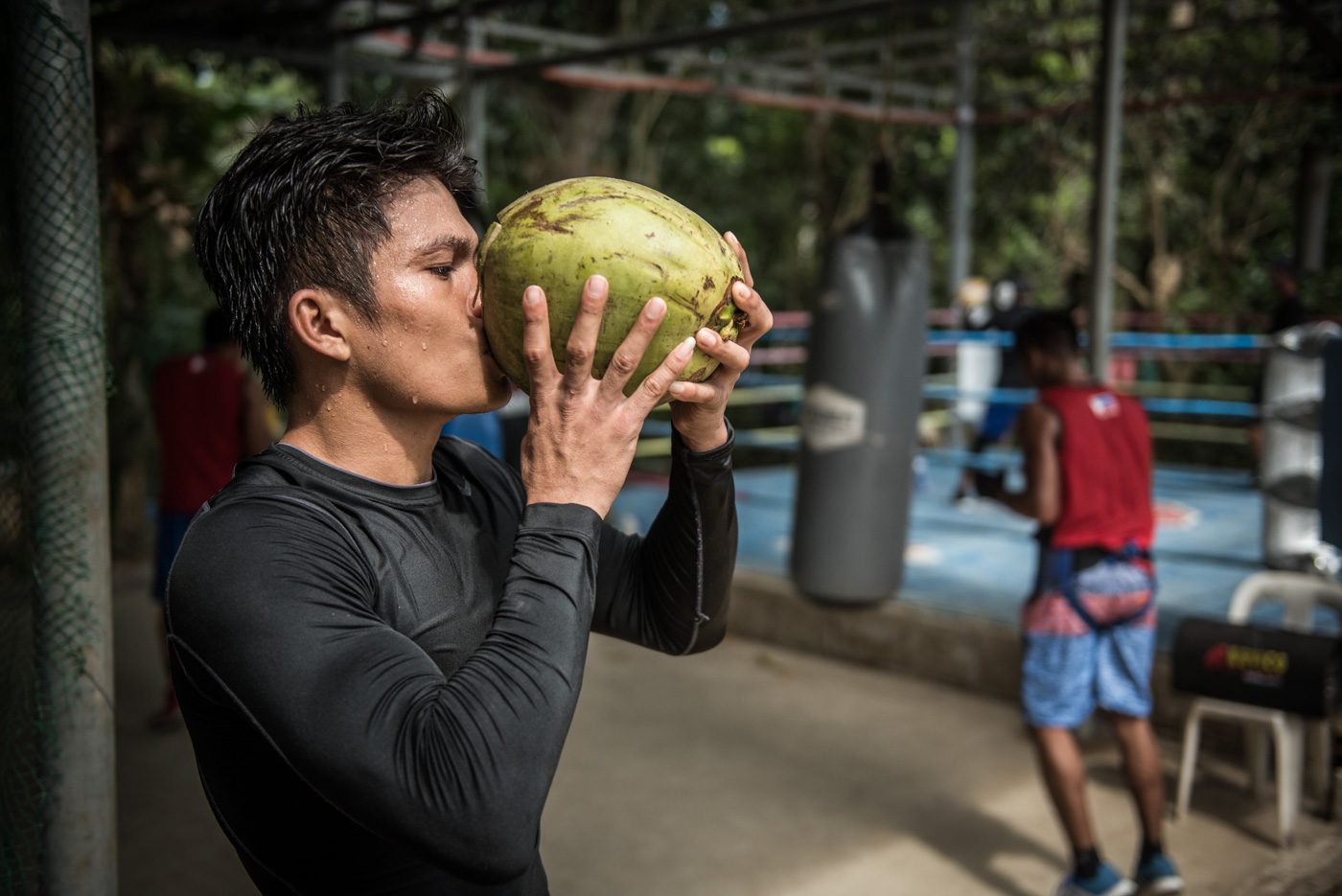SUMMARY
This is AI generated summarization, which may have errors. For context, always refer to the full article.

CAVITE, Philippines – Survival Camp, the boxing complex in Magallanes, Cavite which Jerwin Ancajas now calls home, looks like a scene out of a travel brochure targeted at those who miss the slow, simple life of the provincial Philippines.
A cacophony of sounds blend together ranging from those familiar to boxing, like the double-end bag, fashioned out of a miniature toy basketball in a black stocking, ricocheting back and forth, the thwacking of gloves against a punching bag, mixed with those less associated with the sport, like the crowing of native chickens roaming about the property, to create the complex’s unique atmosphere. The minimalist surroundings are not what you’d expect from the fighter that Ancajas’ new promoter Bob Arum described as “the next Manny Pacquiao,” but anything fancier might seem superfluous.
“We get to focus here because it is far from entertaining places, like going around the mall,” said Ancajas (28-1-1, 19 knockouts), the IBF junior bantamweight champ who is preparing for his fourth title defense against Israel Gonzalez on February 3 in Corpus Christi, Texas. The fight will be his second on ESPN and first in the United States, affording the 26-year-old another opportunity to boost his exposure on the international scene.
Aside from the ring, there is a punching bag, an uppercut bag, and a basketball hoop that is too small for a standard ball to fit through. He’s surrounded by a small circle of friends, assistants and trainers, some of whom sleep on outdoor bunk beds a few yards from the ring. There is also a small house, which began as a single room domicile, that has been expanded to include a storage room, two bed rooms, and a dining room, with a front terrace still being constructed.
He rarely ventures off the premises during training camp to avoid getting sick. The place he’s most likely to visit during those times is a local basketball court, which was unavailable that day due to a fiesta performance scheduled for the following day.
Southeast Asia offers many scenes in boxing that you’ll rarely ever see elsewhere, like how one of the chickens decided to cut across the ring and briefly interrupting Ancajas’ sparring with Ernesto Saulong, to which he laughed and said “It’s good for me to practice my footwork.”
It isn’t only chickens that run across the ring sometimes. Kyle, Jerwin’s two-year-old son, sometimes runs while he’s doing punch mitts with trainer Joven Jimenez. Kyle watches admiringly as his father bangs away at his larger sparring partner, pointing and exclaiming proudly “Papa ko yan!” from outside the ropes.

Even as the father of Kyle and his older brother Kyrie, 4, grows in popularity, Ancajas keeps his children grounded.
“My youngest is still very naughty but I let him be for now because he is still young and cannot yet understand. But my eldest, he can already understand and I can already see him being humble. Like when he plays with other children and they take away his toys, he is just fine with it,” said Ancajas.
Through his hard work, Ancajas’ children will likely never know the struggles that he faced growing up as a young child in Panabo City in Davao del Norte, Philippines.
Ancajas, along with his older brother and younger sister, were raised primarily by their father, who worked on a banana plantation to keep food on the table with his meager earnings. His mother had resettled in General Santos City after splitting with their father. There were times the father took work husking coconuts for extra pesos.
“It was really hard because you really have to work to get food, sometimes you get no food, sometimes you get to eat just a banana or whatever is there. Native chicken if you’re breeding some,” said Ancajas.
“Sometimes when we do not have rice or anything else, we just get bananas…or sweet potatoes.”
Ancajas, like many other young boys in the Philippines, turned to boxing as a means to rise out of poverty. In the second grade he followed his older brother Jesar, also a pro boxer and a one-time sparring partner for Manny Pacquiao, into the gym and found success, winning gold medals in the Palarong Pambansa and other tournaments before opting to turn pro.

He still remembers his initial reluctance to leave Panabo to pursue his professional career. In his third fight, a majority decision over Jimmy Paypa in 2009, he was noticed by Leon Panoncillo Jr, the Asia-Pacific vice president for the WBO sanctioning body, who recommended him to Joven Jimenez, his current manager and trainer. Ancajas met with Jimenez, who was assured by his amateur coach Romeo “Dodong” Desabille that he was a “good guy” and would help take his career to the next level.
“As someone coming from the province, I was scared of going to Manila because it might just be a scam,” Ancajas admits. “I said to myself whatever will happen, I really prayed to God, I said it is all up to you Lord, whatever happens to me when I get to Manila, because I really did not know coach Joven yet, I had no idea of his plans.”
His nerves didn’t ease up once his plane touched down in Manila.
“Coach Joven said I would be fetched at the airport, and I was traveling alone, then when I got here, it took a while for coach Joven to fetch me because his phone got low batt. It took awhile before he replied to me so I stayed in the airport for a long time. I was already texting back home in Davao that I was not yet fetched and they got scared too, that I was really just scammed. So when I first came here, there was a mixture of nervousness,” said Ancajas.
At first he stayed in Taguig, where Jimenez rented a place for his boxing stable. They then relocated to Bacoor, Cavite for a number of years. Yet even as Ancajas rose up the rankings, Jimenez’s finances were dwindling. And by 2013, they had moved to Muntinlupa, then over to Davao before returning to Cavite. At one point Jimenez couldn’t afford to pay him his purse for a fight, and Ancajas and his partner Ruth were living in Jimenez’s living room with their son Kyle.
Jimenez’s stable of fighters had left him, except for the one who once thought he had been left hanging at the airport.
“That’s when Jerwin told me, ‘I will be with you wherever you go,” remembered Jimenez, a former boxer for the Philippine Navy.
“Coach Joven was really already down at that time, but he still tried to get us back up on our feet,” said Ancajas. “And he really tried, he sacrificed everything even the tuition for his children, even when they couldn’t enroll anymore, he sacrificed that just so I could get to where I am now.
“This is all a blessing, we now have our own place, we don’t have to rent, because back when we were renting, if coach Joven couldn’t pay, the caretaker or owner of the house would get angry and pick a fight with coach.”
Their fortunes began to turn when they signed with MP Promotions, and matchmaker Sean Gibbons instantly took a liking to the southpaw, who had developed from a light punching technician to the kind of fighter who can thread the needle with power.

Ancajas finally got his shot at a world title in 2016, dropping McJoe Arroyo once in a decision win at the sparsely attended Navy Gym in Taguig and making the challenger’s minimum purse: $3,750, before deductions. Subsequent purses for title defenses in Macau, Australia and Northern Ireland were much higher, proving their gamble of bringing the fight to friendly territory was worth it.
He hasn’t forgotten his family members now that he has a few bucks in his bank account. He’s currently helping his sister Jean, an OFW in Dubai, put up a home of her own in Davao, where she’ll take care of their mother. He is taking care of their father, who has been unable to work since suffering a spinal injury in a motorcycle accident years ago, and his brother is also part of their training camp.
“Now that I have money I also want to share it with them, especially my kuya because he was the one who introduced me to boxing,” said Ancajas. “So I really want to help him have a house of his own.”
As for investments, Ancajas is considering opening a buffet restaurant, the kind of place where families can enjoy dishes without ever worrying about running out of rice.
Even as his popularity grows, and people stop him more frequently to ask for photos with the champ, Ancajas remains level-headed. He remembers the nights where the only food was bananas, the flight to Manila, the fight without a purse, and the many other sacrifices that came before the spotlight he now finds himself in.
“Whatever you’ve achieved, you cannot boast that I am this now. You should remain what you were when you started, until your career ends. For me, that is how it should be because all of these is borrowed, it will all come to pass. If you are known now, it will soon pass, it will not always stay that way,” said Ancajas. – Rappler.com
Add a comment
How does this make you feel?
There are no comments yet. Add your comment to start the conversation.